An enslaved man was crucial to the Lewis and Clark expedition’s success. Clark refused to free him afterward.
Photo: Ed Hamilton’s York statue on Riverfront Plaza in Louisville. (Raymond Boyd/Getty Images)
(Washington Post) York had done his job superbly.
Whether the enslaved, 30-something black man wanted to participate in Lewis and Clark’s expedition to the Pacific Ocean is impossible to know — almost certainly, no one ever asked him. Compelled to join by the man who owned him, William Clark, York proved crucial to the explorers’ success. He hunted for badly needed food, smoothed relations with Native American tribes, cared for the ill and helped discover new plants and animals.
So, after the voyage’s celebrated conclusion in September 1806 — as his fellow adventurers reveled in newfound fame, land grants and financial awards — York approached Clark, whom he had served since boyhood. Aware he would never receive land or payment, he suggested another form of compensation.
“York was demanding his freedom as his reward for his services on the expedition,” Stephen E. Ambrose wrote in “Undaunted Courage: Meriwether Lewis, Thomas Jefferson and the Opening of the American West.” “Clark refused to free him.” (more)
Remembering June Bacon-Bercey, a Pioneering African American Meteorologist
She is believed to be the first African American woman with meteorological training to deliver weather news on TV
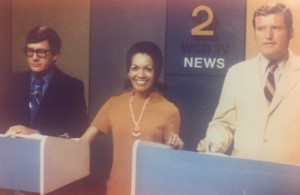
June Bacon-Bercey on Buffalo’s WGR-TV, where she became the first African American female meteorologist to forecast the weather on television. (Courtesy Dail St. Claire)
(Smithsonian Magazine) In 1971, the Buffalo broadcast station WGR-TV was thrown into a tizzy. Its main weather anchor had been arrested and charged with robbing a bank, and the station needed someone to report on the weather. So management turned to June Bacon-Bercey, a reporter with a background in meteorology.
“All hell broke loose at the station,” Bacon-Bercey later recalled in an interview with Bill Workman of the San Francisco Chronicle. “I already knew from my calculations there was going to be a heat wave. When the heat wave hit the next day, the job was mine.”
It was a dramatic start to one of the defining chapters of Bacon-Bercey’s career. She wasn’t the first African-American woman to deliver weather reports on television, but she was the first to do so as a trained meteorologist, according to Daniel E. Slotnik of the New York Times.
Bacon-Bercey died in July at the age of 90, though her death was not widely known until John Roach of AccuWeather reported on it last week. “She was an important trailblazer in many ways,” Steve Cichon, who writes about Buffalo history, told the forecasting service. (more)
TIPHC Black History Month exhibit:
“Legal Path to African American Freedom”
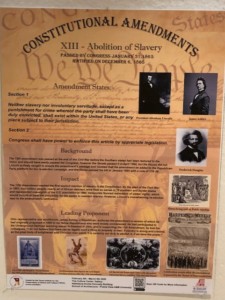 This TIPHC exhibit, “Legal Path to African American Freedom” highlights through 20 pivotal mandates, how, since the arrival of the first group of enslaved Africans in 1619 Virginia, African Americans have been both aided and suppressed by the laws of the land – via the Supreme Court, executive orders of the President of the US, Constitutional Amendments, and Legislative Acts. Presenting this exhibit, in collaboration with PV History Dept. Professor Dr. Ron Goodwin, is our way of charting a journey that in many ways sadly continues today.
This TIPHC exhibit, “Legal Path to African American Freedom” highlights through 20 pivotal mandates, how, since the arrival of the first group of enslaved Africans in 1619 Virginia, African Americans have been both aided and suppressed by the laws of the land – via the Supreme Court, executive orders of the President of the US, Constitutional Amendments, and Legislative Acts. Presenting this exhibit, in collaboration with PV History Dept. Professor Dr. Ron Goodwin, is our way of charting a journey that in many ways sadly continues today.
The posters represent a small sampling of legal detriments and remedies to African American oppression in the United States, the people who pushed for or authored those edicts, and the resulting impacts. From the Virginia Slave Codes of 1705, to the 13th U.S. Constitutional amendment abolishing slavery, to the Emancipation Proclamation, and Civil Rights bills, we trace the legal paths that Black Americans have navigated in seeking freedom, full citizenship, and participation in the democratic process – life, liberty, and the pursuit of happiness.
The exhibit will be on display through March 6, 2020 at the School of Architecture/TIPHC Gallery at the Nathelyne Kennedy Building. For more information, and access to the gallery, contact TIPHC Director Michael Hurd, mdhurd@pvamu.edu, or 936-261-9836.
Also, on Feb. 10, a traveling exhibit will be added to the display. “They Took an Oath” is an eight-piece exhibit of Reconstruction-era documents from Texas’ first African American state legislators and Constitutional Convention Delegates in 1868-1869. Curated by historian Larry Thomas of Austin, the exhibit is a continuation of the 2010 19th century Texas Black Legislators’ Monument Project that led to the Texas African American History Memorial on the state capitol grounds in Austin. The exhibit presents copies of legislative bills, House & Senate Journals and other Reconstruction proposals and resolutions from black legislators relative to their communities.
TIPHC Bookshelf
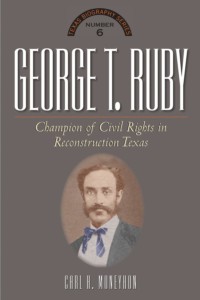 Published scholarship on black history in Texas is growing and we’d like to share with you some suggested readings, both current and past, from some of the preeminent history scholars in Texas and beyond. We invite you to take a look at our bookshelf page – including a featured selection – and check back as the list grows. A different selection will be featured each week. We welcome suggestions and reviews. This week, we offer, “George T. Ruby, Champion of Equal Rights in Reconstruction Texas,” by Carl H. Moneyhon.
Published scholarship on black history in Texas is growing and we’d like to share with you some suggested readings, both current and past, from some of the preeminent history scholars in Texas and beyond. We invite you to take a look at our bookshelf page – including a featured selection – and check back as the list grows. A different selection will be featured each week. We welcome suggestions and reviews. This week, we offer, “George T. Ruby, Champion of Equal Rights in Reconstruction Texas,” by Carl H. Moneyhon.
George T. Ruby was the most widely known of the first generation of black politicians in Texas, establishing during the Reconstruction both a local and national reputation as a strident advocate of equal rights. Born in New York City and reared in Maine, Ruby demonstrated his desire to secure a better place for African Americans at an early age. He migrated to Haiti shortly after graduating from high school as part of an effort to colonize American blacks in a world where their futures were not limited by their race. During the Civil War he moved to Louisiana, where he worked as a teacher among the freedmen. In 1867 he moved to Texas, where he again taught school as an employee of the Freedmen’s Bureau.
Ruby became involved in politics in Texas with the beginning of Congressional Reconstruction in 1867. As an agent of the Loyal League, he became a major force in organizing blacks to vote, and his connections allowed him to run successfully for the 1868 Constitutional Convention. Elected president of the Loyal League in 1868, Ruby used his position to help elect Edmund J. Davis governor in 1869 and also to go to the state senate from Galveston. In the senate he supported the broader agenda of the Republican governor and in return secured support for his own efforts to ensure the protection of basic civil rights for African Americans. At the same time, he established connections with black politicians nationally.
Ruby headed the Texas Republican Party in its unsuccessful efforts at retaining power in 1873. Seeing no future for himself when the Democrats returned to power, Ruby returned to Louisiana, where he spent his later years as a newspaper editor and an advocate of the Exodus, a movement that advocated the removal of blacks from the South and their resettlement in the Midwest. From youth to his death in 1882, Ruby showed himself to be a principled politician committed to bettering the place of African Americans in white America.
This Week in Texas Black History
Feb. 2
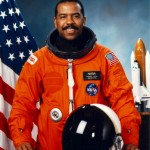
In 1995, on this date, Dr. Bernard Harris, Jr. became the first African-American to walk in space. A native of Temple, Texas, Harris was payload commander aboard Space Shuttle Discovery Mission STS-63, the first flight of the joint Russian-American Space Program. The main objective of the mission was to test systems and techniques to be used on later missions to dock with the Russian Space Station Mir.
Feb. 2
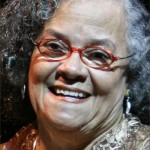
On this date in 1927, musician Ernie Mae Miller was born in Austin. Miller was a graduate of L.C. Anderson High School, which was named for her grandfather. Miller played jazz, blues, gospel, and swing music and performed with the Prairie View Co-eds, a black, all-girl swing band from Texas that toured nationally during World War II. (See “Prairie View A&M University Coeds All Girl Band,” and “What if Jazz History Included the Prairie View Co-eds?” and the TIPHC Bookshelf for “Take-Off: American All-Girl Bands During World War II.”)
Feb. 3
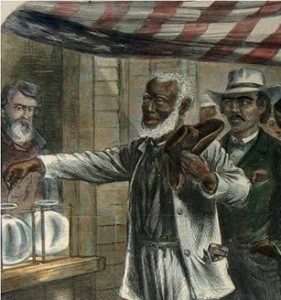
On this day in 1870 the 15th amendment was ratified ensuring the right to vote to all male citizens of the United States, regardless of color or previous condition of servitude. The 15th Amendment opened the door for the elections of African-Americans to the U.S. Congress and to Southern local and state offices. Republicans wanted the 15th Amendment passed to obtain the vote of the freed slaves. However, many women suffragists had worked alongside Black suffragists like Frederick Douglass to gain the right to vote for both groups. However, when the 15th Amendment passed, it angered many women suffragists and some of them spoke out against Black suffrage. Women would not gain the right to vote until 1920.
Feb. 3
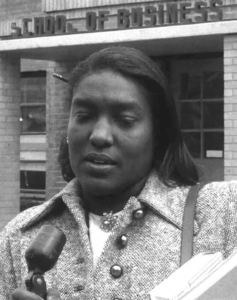
On this day in 1956, Irma Jean Sephas became first African American undergraduate student at North Texas State University. Sephas, 41, was from Fort Worth and majored in business with a music minor. She had previously attended Huston-Tillotson College in Austin.
Feb. 5
On this day in 1840, the Congress of the Republic of Texas passed the Law of February 5. Though there were relatively few free blacks in the republic, legislators concerned over the status of slavery attempted to restrict further the number of free blacks. The law declared that all free blacks who had entered Texas after the Texas Declaration of Independence must leave the republic within two years or be declared slaves for the rest of their lives. Those free blacks who were already in the republic before Texas independence would continue to have all the rights of their white neighbors. Provisions were made for free blacks who entered later to petition the Congress for exception.
Feb. 5
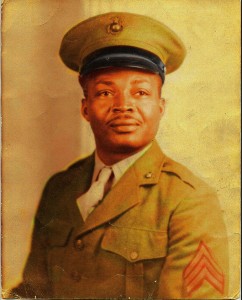
Alfred Masters, the first African American sworn into the U. S. Marine Corps, was born on this day 1916 in Palestine, Texas. Masters was sworn into the marines June 1, 1942. After his swearing in, he trained at Montford Point, North Carolina where other African Americans were later trained (now known as the Montford Point Marines). Masters eventually rose to the rank of technical sergeant.
Feb. 6
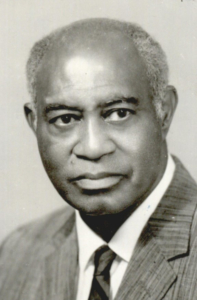
Melvin Tolson, writer, educator, and poet, was born on this day in 1898 in Moberly, Missouri. A graduate of Lincoln (Mo.) University, Tolson began teaching speech and English at Wiley College in 1924. His award-winning debate team, which in 1935 beat the reigning national champion from the University of Southern California, had a 10-year winning steak between 1929 and 1939. Tolson also mentored students such as James L. Farmer, Jr. and Heman Sweatt. In 2007, his story and his team were portrayed in the film, “The Great Debaters.”
Feb. 7
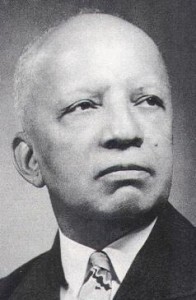
On this date in 1926, historian Dr. Carter G. Woodson, the son of illiterate slaves, initiated the first National Negro Week. In 1972, it was renamed Black History Week and in 1976, it became Black History Month. Said Woodson: “Those who have no record of what their forebears have accomplished lose the inspiration which comes from the teaching of biography and history.”
Blog: Ron Goodwin, Ph.D., author, PVAMU history professor
Ron Goodwin is an assistant professor of history at Prairie View A&M University. Even though he was a military “brat,” he still considers San Antonio home. Like his father and brother, Ron joined the U.S. Air Force and while enlisted received his undergraduate degree from Texas Lutheran University in Seguin, Texas. After his honorable discharge, he completed graduate degrees from Texas Southern University. Goodwin’s book, Blacks in Houston, is a pictorial history of Houston’s black community. His most recent book, Remembering the Days of Sorrow, examines the institution of slavery in Texas from the perspective of the New Deal’s Slave Narratives.
Recent Posts
Worried?
I have a confession. I’m a worrier. But I don’t worry if the Dallas Cowboys or the Houston Texans will make the playoffs, I worry about my family’s health and well being. Right now I’m especially worried about my mother and one of my brothers-in-law. Both are dealing with issues that I pray daily about. And I know I’m not supposed to worry, the Good Book teaches that if the Provider takes care of the…(more)
Football is still football
October 14th, 2019
Since we’re into the football season I thought it was time to interject my two cents. I’ve noticed several teams starting black quarterbacks these days. Some because of injury, but others have been under center since training camp. By my count, the first weekend of the National Football League season in September saw nine African…(more)
Submissions wanted
Historians, scholars, students, lend us your…writings. Help us produce the most comprehensive documentation ever undertaken for the African American experience in Texas. We encourage you to contribute items about people, places, events, issues, politics/legislation, sports, entertainment, religion, etc., as general entries or essays. Our documentation is wide-ranging and diverse, and you may research and write about the subject of your interest or, to start, please consult our list of suggested biographical entries and see submission guidelines. However, all topics must be approved by TIPHC editors before beginning your research/writing.
We welcome your questions or comments. Please contact Michael Hurd, Director of TIPHC, at mdhurd@pvamu.edu.
